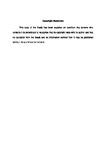Spirited Measures and Victorian Hangovers: Public Attitudes to Alcohol, the Law and Moral Regulation.
| dc.contributor.supervisor | Stevenson, Kim | |
| dc.contributor.author | Yeomans, Henry | |
| dc.contributor.other | Faculty of Arts, Humanities and Business | en_US |
| dc.date.accessioned | 2012-05-24T08:55:26Z | |
| dc.date.available | 2012-05-24T08:55:26Z | |
| dc.date.issued | 2012 | |
| dc.identifier | 10131380 | en_US |
| dc.identifier.uri | http://hdl.handle.net/10026.1/1006 | |
| dc.description.abstract |
From alarm about the prospect of ‘twenty-four drinking’ to campaigns for a minimum price per unit, the last decade has shown that alcohol consumption is an inflammatory issue in this country. It has become commonplace to hear that drinking is ‘out of control’ and that it is a new and worsening problem largely unique to Britain. However, comparative research reveals that alcohol consumption in Britain is not unusually high and even a cursory glance at history shows that extreme bouts of alarm about drinking have been common on these shores since at least the eighteenth century. What is at the root of this national neurosis about alcohol? This thesis considers the historical development of both public attitudes to alcohol and laws relating to alcohol in England and Wales. Covering issues of crime, disorder, health and immorality, it investigates the various means through which alcohol has been constructed as a social problem through time. This qualitative focus on change and continuity in history allows for the attitudinal and legal impact of certain key developments to be assessed. Particular attention is paid to the Victorian temperance movement which, drawing especially on the ideas of Hunt and Ruonavaara, is characterised as a moral regulation project. It is argued that, although the temperance movement itself declined in the early twentieth century, the moral regulation project it initiated continues, in certain ways, to shape public attitudes towards drinking and the legal regulation of alcohol in the present day. Rather than being a response to contemporary behavioural trends, this thesis proposes that continuing anxieties, apparent in how we think about and regulate alcohol, are more usefully understood as a hangover from the Victorian period. | en_US |
| dc.description.sponsorship | ESRC | en_US |
| dc.language.iso | en | en_US |
| dc.publisher | University of Plymouth | en_US |
| dc.subject | Alcohol | en_US |
| dc.subject | Attitudes | en_US |
| dc.subject | Temperance | |
| dc.subject | Licensing | |
| dc.subject | Moral Regulation | |
| dc.title | Spirited Measures and Victorian Hangovers: Public Attitudes to Alcohol, the Law and Moral Regulation. | en_US |
| dc.type | Thesis | |
| dc.identifier.doi | http://dx.doi.org/10.24382/4790 |
Files in this item
This item appears in the following Collection(s)
-
01 Research Theses Main Collection
Research Theses Main


